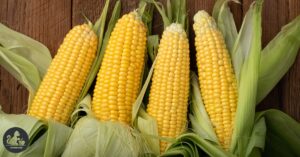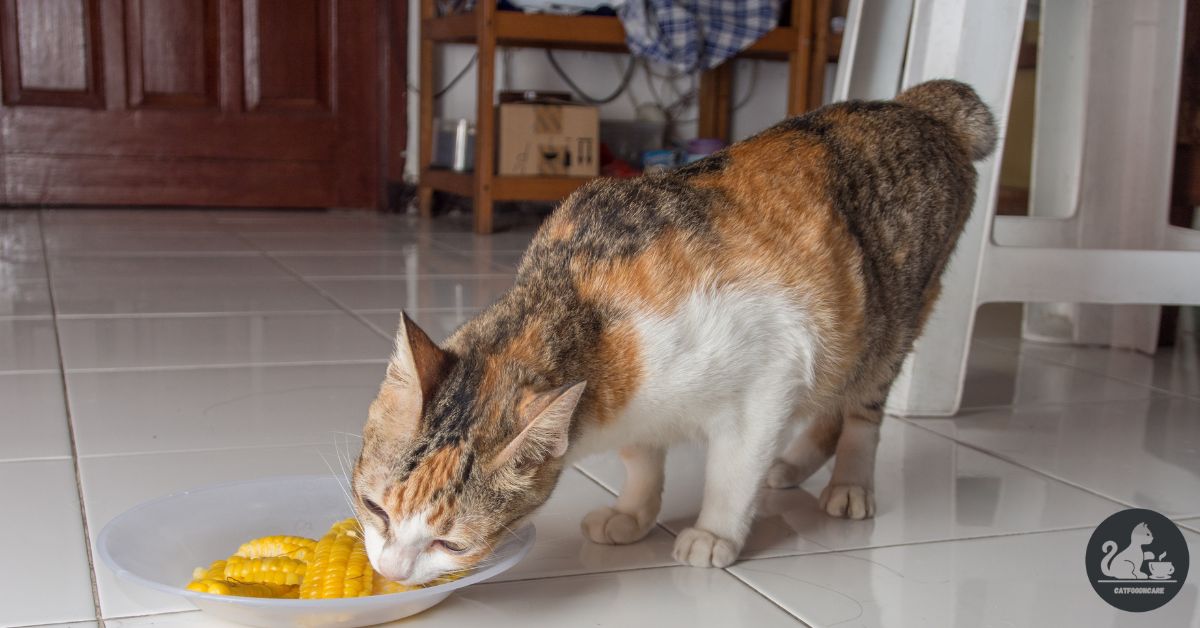Cats are known for their finicky eating habits, but have you ever wondered, “Can cats eat corn?” The answer is yes, but with some caveats. While corn is not harmful to cats, it should not be a primary source of their diet. Corn products like corn chips, corn dogs, or corn cobs are often loaded with additional ingredients such as salt and oil which can lead to health issues in cats.
Corn can be a tasty treat for your feline companion, but it’s important to remember that cats are carnivores. Their daily food intake should primarily consist of meat protein, not corn or other grains. While corn does provide some dietary fiber and fatty acids, it lacks the essential amino acids that cats need.
Moreover, some cats may have allergic reactions to corn. So, while an occasional treat of plain corn or corn kernels might be okay, it’s best to consult your veterinarian for advice. Always remember, a balanced diet is key to your cat’s health.
Commercial cat foods often use corn as a common filler ingredient. However, it’s important to read the label and ensure that the food also contains sufficient amounts of animal muscle meat.
While corn is not necessarily bad for cats, it should not be a main food source. It’s always best to consult with your regular veterinarian or a pet insurance plan before making any major changes to your cat’s diet.
What Do Veterinarians Say about Feeding Corn to Cats?
Veterinarians generally agree that corn is not harmful to cats, but it should not be a primary food source. Corn products like corn chips or corn dogs are often high in salt and fat, which can lead to health issues in cats. Corn cobs and corn husks can be dangerous if ingested, as they can cause digestive distress or even blockages in the digestive tract.

While corn is a common ingredient in many commercial cat foods, it is usually used as a filler ingredient. It does provide some dietary fiber and carbohydrates, but it lacks the essential amino acids and animal protein that cats need. Cats are obligate carnivores, which means they require nutrients from meat. Therefore, a diet high in corn and low in meat protein can lead to health conditions.
If your cat enjoys the taste of corn, it can be given as an occasional treat. Plain corn, canned corn, or frozen corn can be a tasty treat for your feline companion. However, always avoid giving your cat corn with additional ingredients like butter or salt. Some cats may have allergic reactions to corn, so introduce it slowly and watch for any signs of upset stomach or loss of appetite.
While corn is not necessarily bad for cats, it should not make up a large part of their diet. Always consult your veterinarian for advice on your cat’s diet and consider a pet insurance plan to cover potential health issues.
Can Cats Eat Corn?
Yes, cats can eat corn, but it should not be a primary source of nutrition in their diet. Corn products like corn kernels and corn chips can be given as an occasional treat. However, it’s important to note that corn doesn’t provide the essential amino acids and animal muscle meat nutrients that cats need.
Corn is a common ingredient in many commercial cat foods and pet foods. It’s used as a filler ingredient due to its ready availability and high carbohydrate content. But, too much corn in a cat’s daily food intake can lead to health issues like obesity and allergies.
Some cats may also have allergic reactions to corn. Symptoms can include gastrointestinal symptoms, loss of appetite, and digestive distress. If you notice any of these health conditions in your feline companion, consult your regular veterinarian for advice.
Remember, while corn can be a tasty treat for humans, it’s not a balanced diet for cats. Always ensure your cat’s meal plan includes a good amount of meat protein and essential nutrients. If you’re unsure about feeding corn to your cat, it’s best to consult with a vet or a pet insurance plan provider.
Avoid feeding your cat corn cobs, as they can cause severe stomach upsets. Also, avoid corn products with additional ingredients like extra salt or common allergens, which can be harmful to cats.
While cats can eat corn, it should only be given in moderation and not as a regular part of their diet.
Nutritional Benefits of Corn for Cats?
Corn is a common ingredient in many commercial cat foods. Here are some nutritional benefits of corn for cats:
- Corn is a source of protein: While it’s not as beneficial as animal muscle meat, corn does provide some protein. However, it should not be the primary source of protein in your cat’s diet.
- Corn provides dietary fiber: The fiber content in corn can aid in your cat’s digestion and bowel movements.
- Corn is a source of essential amino acids: These are necessary for your cat’s health, but they should also get these nutrients from meat.
- Corn contains fatty acids: These can contribute to your cat’s overall health.
- However, it’s important to note that while corn can be a part of your cat’s diet, it should not be the main food source. Corn products like corn chips, corn dogs, and corn cobs can contain harmful ingredients and should be avoided. Always consult with your veterinarian for advice on your cat’s diet.
Corn can be an occasional treat for your feline companion, but it should not replace a balanced diet of meat protein and other essential nutrients.
Potential Health Risks of Feeding Corn to Cats?
- Feeding corn to cats can potentially lead to several health issues.
- Corn products like corn chips and corn dogs often contain additional ingredients like salt and flavorings that can be harmful to cats.
- Corn husks and corn cobs can cause digestive distress or even blockages in the digestive tract if ingested.
- Some cats may have allergic reactions to corn, resulting in skin irritations or gastrointestinal symptoms.
- Corn is high in carbohydrates and lacks the essential amino acids and animal muscle meat proteins that cats need, potentially leading to nutritional deficiencies if it becomes a primary food source.
- The high fiber content in corn can alter bowel movements and potentially cause stomach upset.
- Corn is a common filler ingredient in many commercial cat foods and pet foods, but it should not replace meat as the primary source of protein in your cat’s diet.
- Overconsumption of corn can lead to obesity due to its high caloric intake.
- Always consult with a veterinarian for advice before introducing new foods into your cat’s diet.
- Remember, while corn can be a tasty treat for humans, it should only be an occasional treat for your feline companion.
How to Feed Corn to Cats Safely?
Feeding corn to cats can be a fun and tasty treat for your feline companion. However, it’s important to do it safely to avoid any potential health issues. Here’s a step-by-step guide on how to feed corn to cats safely.
Step 1: Choose the Right Type of Corn
Cats can eat various types of corn, including sweet corn, corn kernels, and canned corn. However, avoid corn products like corn chips, corn dogs, and corn flakes as they contain additional ingredients that could be harmful to cats. Also, corn cobs and corn husks should be avoided as they can cause digestive distress.
Step 2: Prepare the Corn Properly
Before feeding corn to your cat, ensure it’s properly cooked. Raw corn can be hard for cats to digest and could lead to stomach upset. Avoid adding any extra salt or other seasonings as these can be harmful to cats. Plain corn is the best option.
Step 3: Serve in Small Amounts
Corn should only be an occasional treat for cats, not a primary source of nutrition. Cats require a diet high in animal protein, and corn is not a good source for this. So, serve corn in small amounts, mixed in with their regular cat food.
Step 4: Monitor Your Cat’s Reaction
After feeding corn to your cat, monitor them for any allergic reactions or health issues. Some cats may be allergic to corn, causing symptoms like loss of appetite, digestive issues, or skin problems. If you notice any of these symptoms, stop feeding corn to your cat and consult your veterinarian for advice.
Step 5: Maintain a Balanced Diet
While corn can be a tasty treat for cats, it should not replace a balanced diet. Commercial cat foods are specially formulated to provide all the essential nutrients cats need. Corn should only be an additional treat, not a regular part of their daily food intake.
Remember, while corn is a popular food source for humans, it’s not necessarily the best food for cats. Always consult with your regular veterinarian or a pet insurance plan before introducing new foods into your cat’s diet. This will ensure your cat stays healthy and happy, while also avoiding unnecessary vet bills.
While cats can enjoy the sweet taste of corn kernels as an occasional snack, it’s important to feed it to them safely. Follow these steps to ensure your cat can enjoy this tasty treat without any health issues.
Conclusion
Cats can safely consume corn in moderation. While corn products like corn chips, corn dogs, and corn flakes are not suitable due to their additional ingredients and high salt content, plain corn can be a tasty treat for your feline companion. However, it’s important to remember that corn should not replace meat protein in your cat’s diet. Commercial cat foods often use corn as a common filler ingredient, but it does not provide the essential amino acids and nutrients from meat that cats need. Always consult with your regular veterinarian before introducing new food items to your cat’s diet. Remember, while corn can be an occasional treat, it should never become a primary source of nutrition for your cat.
Recent Posts
10 Best Canned Cat Foods of 2024, According to Veterinarians
Inside this expert-backed list of 2024's top wet cat foods, discover why veterinarians trust these brands for optimal feline nutrition.
Grab expert insights into the top-rated wet cat foods that veterinarians trust most, and discover why some brands outshine...

